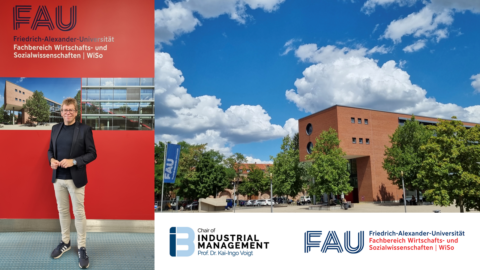THE Impact Ranking 2023: FAU and two other German universities lead the world in industrial research
One month ago, the global Times Higher Education Impact Ranking was published (https://www.timeshighereducation.com/impactrankings). Universities worldwide were assessed on their contribution to achieving the 17 Sustainable Development Goals (SDGs) defined by the United Nations in 2015. For SDG #9 “Industry, Innovation and Infrastructure,” three German universities share the first place: the Technical University of Munich, the University of Stuttgart and the Friedrich Alexander-University of Erlangen-Nuremberg. All three universities briefly reported this gratifying result and quickly went back to their daily business. Too quickly? In any case, it is worth taking another look at the ranking results to fully acknowledge its significance.
The subject of this ranking is industry-related research. With a weight of 11.6%, research publications from 2017 to 2021 on the topics of industry, innovation and infrastructure are included. The exact list of “keywords” applied has not been published, but it stands to reason to assume topics such as (sustainable) energy generation and grids, electromobility, Industry 4.0, smart cities, additive manufacturing, robotics, medical technology and others here. Obviously, German universities are very successful in driving these and other topics in close cooperation with companies. This is also reflected in another important criterion of the THE Ranking, third-party funding from industry, which is included in the ranking result with a weight of 38.4%. Here, the ranking captures third-party funding income in a wide range of disciplines, namely STEM, medicine, economics and social sciences, as well as arts and humanities. In order to treat large and small universities equally, third-party revenues were measured per full-time position.
Equally research-related is the third criterion (weight: 15.4%), namely the extent to which worldwide patent applications draw on and cite research results from the university evaluated. German universities evidently score particularly well on this criterion as well. The fourth and last criterion of the ranking (weight 34.6%), the number of university spin-offs, shows that universities make economic use of their know-how. It measures the number of university spin-offs founded between 2000 and 2020 that were still in existence at the time of the survey (2023).
How should these results be interpreted? First of all, it should be noted that in contrast to a purely subject-related rankings, in which German universities rarely occupy top positions on a worldwide scale, here a cross-disciplinary ranking was undertaken to measure the performance of universities in industry-related research – in rather different disciplines. The fact that the universities in Stuttgart, Munich and Erlangen-Nuremberg have now been ranked as world leaders can certainly be explained, as all three cities or metropolitan regions have a strong (industrial) corporate environment. The geographical proximity to these companies seems to have a positive effect on the intensity and quality of collaboration. This ranking makes it strikingly clear where specific strengths of German universities lie or could lie – strengths of which we should be aware. In the THE Impact ranking, for example, only two U.S. universities are among the top 100 in the category “Industry, Innovation and Infrastructure,” and they tend to be at the “bottom of the list” (University of South Florida: 49th place; MIT: 69th place).
However, one should not overlook the fact that this is an impact ranking, i.e., the evaluation of the ability of universities to contribute to the solution of urgent (sustainability) problems with scientific findings. With all due caution, it may be stated that German universities are apparently very successful in achieving such impacts with their research results. These strengths should also be used and expanded in tackling upcoming and future challenges, in relation to industry, for example, on the topics of “industrial platforms”, the “industrial metaverse” and the industrial use of AI.
The ranking also emphasizes that companies are able to deliver significant contributions to achieving the global sustainability goals, and will continue to do so in the future: with their products and services, their systems and technologies. A targeted university-industry collaboration is an important success factor here.
Despite all the obligations for future work, today the encouraging bottom line remains: German universities can be world leaders in interdisciplinary research areas, e.g., in the field of “sustainability”, if you look at it from the point of view of its result, its “impact”.
